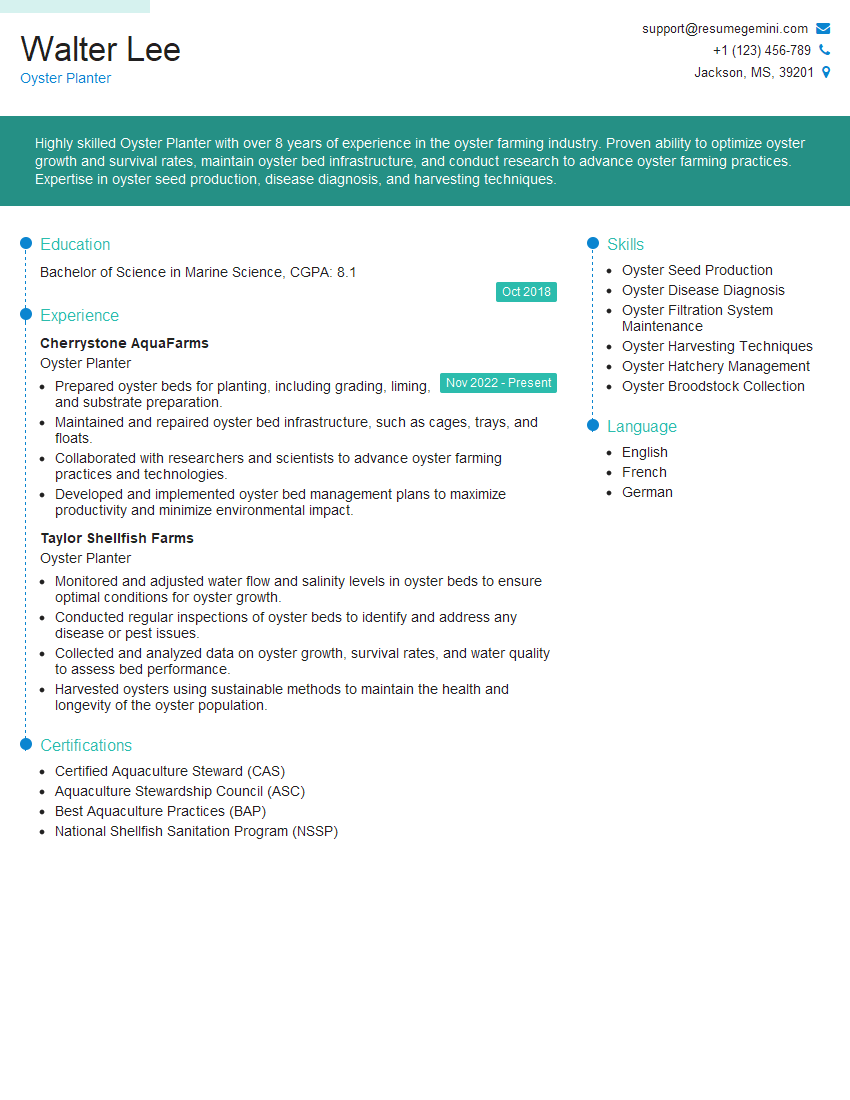Are you a seasoned Oyster Planter seeking a new career path? Discover our professionally built Oyster Planter Resume Template. This time-saving tool provides a solid foundation for your job search. Simply click “Edit Resume” to customize it with your unique experiences and achievements. Customize fonts and colors to match your personal style and increase your chances of landing your dream job. Explore more Resume Templates for additional options.

Walter Lee
Oyster Planter
Summary
Highly skilled Oyster Planter with over 8 years of experience in the oyster farming industry. Proven ability to optimize oyster growth and survival rates, maintain oyster bed infrastructure, and conduct research to advance oyster farming practices. Expertise in oyster seed production, disease diagnosis, and harvesting techniques.
Education
Bachelor of Science in Marine Science
October 2018
Skills
- Oyster Seed Production
- Oyster Disease Diagnosis
- Oyster Filtration System Maintenance
- Oyster Harvesting Techniques
- Oyster Hatchery Management
- Oyster Broodstock Collection
Work Experience
Oyster Planter
- Prepared oyster beds for planting, including grading, liming, and substrate preparation.
- Maintained and repaired oyster bed infrastructure, such as cages, trays, and floats.
- Collaborated with researchers and scientists to advance oyster farming practices and technologies.
- Developed and implemented oyster bed management plans to maximize productivity and minimize environmental impact.
Oyster Planter
- Monitored and adjusted water flow and salinity levels in oyster beds to ensure optimal conditions for oyster growth.
- Conducted regular inspections of oyster beds to identify and address any disease or pest issues.
- Collected and analyzed data on oyster growth, survival rates, and water quality to assess bed performance.
- Harvested oysters using sustainable methods to maintain the health and longevity of the oyster population.
Certificates
- Certified Aquaculture Steward (CAS)
- Aquaculture Stewardship Council (ASC)
- Best Aquaculture Practices (BAP)
- National Shellfish Sanitation Program (NSSP)
Languages
- English
- French
- German
Career Expert Tips:
- Select the ideal resume template to showcase your professional experience effectively.
- Master the art of resume writing to highlight your unique qualifications and achievements.
- Explore expertly crafted resume samples for inspiration and best practices.
- Build your best resume for free this new year with ResumeGemini. Enjoy exclusive discounts on ATS optimized resume templates.
How To Write Resume For Oyster Planter
- Highlight your experience in oyster seed production, hatchery management, and disease diagnosis to demonstrate your expertise in oyster farming.
- Quantify your accomplishments whenever possible, such as increasing oyster growth rates or reducing disease outbreaks.
- Showcase your knowledge of sustainable oyster farming practices and your commitment to environmental conservation.
- Emphasize your willingness to work in a challenging outdoor environment and your ability to handle physically demanding tasks.
Essential Experience Highlights for a Strong Oyster Planter Resume
- Monitored and adjusted water flow and salinity levels in oyster beds to ensure optimal conditions for oyster growth.
- Conducted regular inspections of oyster beds to identify and address any disease or pest issues.
- Collected and analyzed data on oyster growth, survival rates, and water quality to assess bed performance.
- Harvested oysters using sustainable methods to maintain the health and longevity of the oyster population.
- Prepared oyster beds for planting, including grading, liming, and substrate preparation.
- Maintained and repaired oyster bed infrastructure, such as cages, trays, and floats.
- Collaborated with researchers and scientists to advance oyster farming practices and technologies.
Frequently Asked Questions (FAQ’s) For Oyster Planter
What are the key skills required to be an Oyster Planter?
The key skills required to be an Oyster Planter include oyster seed production, oyster disease diagnosis, oyster filtration system maintenance, oyster harvesting techniques, oyster hatchery management, and oyster broodstock collection.
What are the primary responsibilities of an Oyster Planter?
The primary responsibilities of an Oyster Planter include monitoring and adjusting water flow and salinity levels in oyster beds, conducting regular inspections of oyster beds, collecting and analyzing data on oyster growth, survival rates, and water quality, harvesting oysters using sustainable methods, preparing oyster beds for planting, maintaining and repairing oyster bed infrastructure, and collaborating with researchers and scientists to advance oyster farming practices and technologies.
What is the job outlook for Oyster Planters?
The job outlook for Oyster Planters is expected to be good over the next few years, with a projected growth rate of 5% from 2022 to 2032. This growth is due to the increasing demand for oysters as a food source and the growing popularity of oyster farming as a sustainable aquaculture practice.
What are the educational requirements to become an Oyster Planter?
The minimum educational requirement to become an Oyster Planter is a high school diploma. However, many Oyster Planters have a Bachelor of Science degree in Marine Science or a related field.
What is the average salary for an Oyster Planter?
The average salary for an Oyster Planter is around $35,000 per year.
What are the benefits of working as an Oyster Planter?
The benefits of working as an Oyster Planter include working in a beautiful outdoor environment, contributing to the production of a sustainable food source, and helping to protect the environment.
What are the challenges of working as an Oyster Planter?
The challenges of working as an Oyster Planter include working in all types of weather conditions, dealing with pests and diseases, and lifting heavy objects.
What is the future of oyster farming?
The future of oyster farming is bright. Oysters are a sustainable and nutritious food source, and the demand for them is growing. As the world’s population continues to grow, oyster farming will become increasingly important in meeting the demand for food.